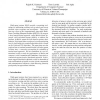132 search results - page 9 / 27 » Adversarial Behavior in Multi-agent Systems |
ICMAS
1998
13 years 9 months ago
1998
We describe a framework that can be used to model and predict the behavior of MASs with learning agents. It uses a difference equation for calculating the progression of an agent&...
ESAW
2004
Springer
14 years 1 months ago
2004
Springer
In this paper we present analysis and calibration techniques that exploit knowledge about a multi agent society in order to calibrate the system parameters of a corresponding socie...
SASO
2007
IEEE
14 years 2 months ago
2007
IEEE
Multi-agent systems (MAS) provide a promising technology for addressing problems such as search and rescue missions, mine sweeping, and surveillance. These problems are a form of ...
HICSS
2003
IEEE
14 years 1 months ago
2003
IEEE
We adopt the decision-theoretic principle of expected utility maximization as a paradigm for designing autonomous rational agents operating in multi-agent environments. We use the...
AAMAS
2005
Springer
13 years 8 months ago
2005
Springer
Cooperative multi-agent systems are ones in which several agents attempt, through their interaction, to jointly solve tasks or to maximize utility. Due to the interactions among t...

